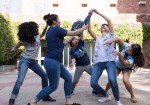UCLA Sex Squad members will dance, sing and roll condoms on foam fingers in their upcoming show “ForePLAY.”
The undergraduate sexual health performance group will debut a set of educational skits in its show “ForePLAY” in Kaufman Hall on Wednesday. The group’s performance follows the narratives of three different characters all while touching upon sexual health topics such as consent, sexually transmitted infection testing and coming out.
Bobby Gordon, co-founder of UCLA Sex Squad and assistant director of the UCLA Art and Global Health Center, said Wednesday’s program seeks to debunk myths around sexual health through performative art. Gordon said demystifying the topic will hopefully encourage safer sex practices for the upcoming Valentine’s Day holiday.
“So often when conversations about sex happen, if they do happen, they are viewed as a very clinical experience,” Gordon said. “Sex Squad is all about subverting that experience and seeing laughter, joy and play as critical parts of sexual health.”
Gordon said sexual education programs can sometimes take an overly cautious approach to sex by talking about it as a purely biological function. Adding humor, dance and other forms of art to the subject allows audience members to both learn about sex and feel comfortable talking about it, he added.
“We learn from what entertains us. We learn from what makes us laugh, what excites us and it’s in our memory,” he said. “When we engage with art, we engage on a deeper level.”
UCLA Sex Squad member Oscar Tsukayama plays a closeted gay man who expresses himself through dance and choreography. The fourth-year world arts and cultures student said his character, Javier, explores his sexuality through genres of dance that seem masculine or feminine such as hip-hop and jazz, respectively. As a dancer, Tsukayama said he can connect personally to the story he’s sharing.
“The idea that being a male dancer means being gay reflects a very homophobic attitude,” he said. “I’ve had pressure put on me to come out, even though I’m not gay, and it’s been something I’ve had to live with for the majority of my life.”
Tsukayama said his character, surrounded by homophobia and toxic masculinity perpetrated by his father, stays in the closet due to a fear of nonacceptance. But by uploading his dance videos to YouTube, Javier finds the strength to come out and define his own identity.
Tsukayama said he hopes people who see his piece will reflect on their insecurities regardless of their sexual orientations. He said he wants the audience to recognize the forces that may oppress them and to learn how to counter negative influences to feel more comfortable in their own skin.
“I want (audience members) to know that it’s always better to express themselves as who they are as opposed to hiding behind these insecurities,” he said.
Mai-Lin Graves, a second-year undeclared student, said she also resonates with the narrative she will perform in “ForePLAY.” During her 10-minute skit, Graves plays a young woman who is catcalled by other characters.
She said she created her skit by having conversations with other women who have been catcalled and then adapting their experiences into the onstage scenario. After running some skits once, including Graves’, the Sex Squad encourages the audience to actively participate in the pieces. Graves said the Sex Squad will select an audience member to replace her as the lead on stage. From there, the group will encourage the spectator to think and act how they would in response to catcalling, possibly yielding a different result from the original show.
“Putting them in my place makes them think about how they would react to the catcalling,” she said. “It also makes them reflect on how they may interact with others, especially women.”
Both Graves and Tsukayama said the sexual education they received growing up shied away from the concept of sex as a pleasurable experience. And because of this wary approach, topics such as consent, sexual identity and sexual health have been stigmatized, Graves said.
Veline Mojarro, the group’s co-director, said direct and open engagement is necessary to talk about more personal topics such as sexual health. Whether it’s through song, dance or acting, Mojarro said the UCLA Sex Squad skits try to counteract the stigma that society has placed on sex.
During one scene, a father and son will sing lyrics concerning different types of penetration and condom usage. The father, donning a top hat, sings, “Penis in vagina and sometimes in the anus,” as ensemble members march and dance behind him. After explaining the logistics of practicing safe sex to his son, the father sings, “Sparks will fly and by sparks I mean their pants.”
“We live in a very particular time and have lived in such a time where conversations around sex aren’t happening,” Mojarro said. “We use our humor to have fun at the moments where we’d normally feel awkward and laugh at what scares us.”
She added she hopes the audience will reflect on how the scenes make them feel, while also enjoying a few laughs. However, most importantly, she said she wants people to learn how to advocate for their own sexual health after seeing the show.
“Everyone has their own needs, wants and desires,” Mojarro said. “We can’t decide what’s right for them, only provide choices so they can learn how to make the right ones.”
